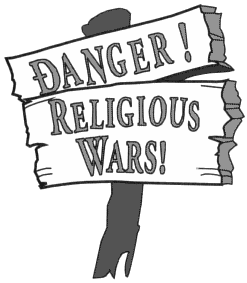However, because it's not my intention to insult those, Christian or otherwise, who find themselves taken by these objections, I opted for the descriptor "popular" in place of bad, to communicate the common, perhaps less sophisticated nature of these objections in comparison to more scholarly, academic ones.
Also, this gives me the opportunity to answer a wider array of objections, including those that are popular, but not necessarily poorly thought out.
In fact, we start with just such an objection which alleges that religion, in general, and Christianity, in particular, cannot be true or should be rejected because of the copious amounts of violence and wars they produce.
Let me outline 5 rebuttals to this objection.
1. Abuses Do Not Negate Uses.
Any worldview, belief system, or ideological principle can be abused by self-promoting individuals to further their wicked agendas.
Thus, even if someone uses religion as a justification for a violent act, unless we can draw a clear line between the act and the specific precepts of the religion in question which could conceivably allow for or otherwise justify such violence, we cannot simply assume such a religion does in fact justify the violent act and is not simply being taken advantage of by the perpetrator.
Such an abuse could not be used to disqualify the specific religion or all religions in any sense.
2. The Diversity of Religious Belief.
Religion can be understood as a set of beliefs or practices centered around the divine or sacred.
It is unnecessary and indeed impossible to capture here the world's staggering amount of religious diversity, past and present, and the various relationships these religions have to violence.
Thus, from the onset, it is far too simplistic to blame "religion", broadly, for wars and violence as though religion were (1.) homogeneous (which it is not) or (2.) had some inherent violent-producing properties (which it does not).
This rebuttal is in keeping with the study "Five Key Questions Answered on the Link between Peace and Religion”, published by the Institute for Economics and Peace, published in 2014, which looked at thirty-five major conflicts waged in 2013 concluded no "general causal relationship" existed between these conflicts and religion.
In fact, while no shortage of speculation and theories exist, no such relationship has ever been demonstrated in any way.
3. The Absence of Historical Evidence
 | |||
| From the Christian Answers and Research Ministry. |
The massive Encyclopedia of Wars, published in 2008, documented a whopping 1,763 wars fought throughout human history and judged that not quite 7% or 123 wars, to be exact, were ‘religious in nature’.
Far and away most wars have been fought for socio-economic and political reasons, not religion.
4. The Bloody History of Atheistic Regimes
Furthermore, when we look at atheist revolutionaries like Benito Mussolini, Mao Zedong, Joseph Stalin, Pol Pot, Josip Broz Tito, Kim Il Sung, Vladimir Lenin, and others of the 20th century, the tens of millions of people killed surrounding their violent activities far outstrips those killed in wars fought for religious reasons (which account for 2 percent of all such fatalities, according to the Encyclopedia of Wars).
Indeed, if you take the 20 million (a very low number) people Stalin alone killed and stack that against the 1.7 million killed in the Crusades and the 3000 executed during the Inquisition, you don't reach even 20% of this one evil dictator.
And to the extent one argues that other factors like Communism played a role in one or more of the atrocities wrought by these irreligious men, which is undeniable, we ask that the same attention to detail and nuance be given to the socio-political nature of the so-called religious conflicts for which believers have been taken to task (such as the Crusades, the Inquisition, unrest in Northern Ireland, etc.).
5. Important But Besides The Point Of Truth
Finally, even to the degree that religious conflicts do exist, and they do, this has no bearing on the general meaningfulness of religion as a way of looking at and describing reality or the truth of Christianity, particular.
"Religion causes wars" is not logically opposite "God exists", "Jesus Christ rose from the dead", or "the Bible is divinely authoritative", truths upon which the Christian commitment to following God rests.
Conclusion
We have see that abuses do not negate uses relative to the abuse of religion by violent individuals, that religion is a diverse body of thought with no inherently violent or violent-producing properties, that 97% of history's wars were not religious in nature, that atheist regimes of the 20th century were responsible for the most loss of life in violent conflict, and that the objection itself does not even touch on the truth of religion as a way of looking at the world.
With this objection out of the way, I hope we can consider more carefully the nature of the wars fought in the Bible, for example, the mnistry of peace prophesied in the coming Messiah, and the way the peace teachings of Jesus work to make those prophecies a reality in view of his Second Coming to put an end to violence once and or all.

No comments:
Post a Comment